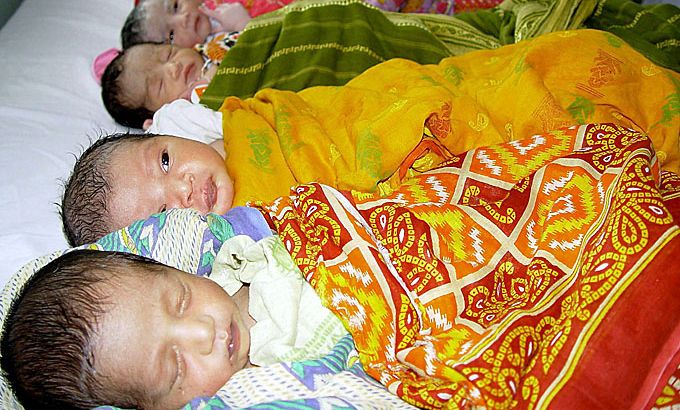
The ‘genocide’ of India’s daughters
We ask if the patriarchal mindset that runs across castes and class can be changed to prevent foeticide and infanticide.
Supreme Court judges in India have summoned the health secretaries in seven states over a worrying fall in the number of young girls in India.
They are demanding details about clinics flouting the Pre-Conception and Pre-Natal Diagnostic Techniques Act – to determine the sex of unborn babies – with potentially fatal consequences.
The judges are blaming what they call rampant foeticide and infanticide, and they say the mindset of parents and society need to change.
|
“The people [district medical officers] who are supposed to be enforcing the [Pre-Conception and Pre-Natal Diagnostic Techniques Act] they themselves have the same patriarchal mindset and they don’t feel that it’s wrong to kill a girl child in the desire for a boy, naturally they won’t go and prosecute anybody. Add to it corruption [within the medical profession].” – Mitu Khurana, a pediatrician and a women’s rights activist |
The UN children’s charity UNICEF says the culture of favouring males in India is costing the lives of millions of young girls.
The agency says more than 2,000 illegal abortions are being carried out every single day, and it is dramatically altering the balance of the population.
It warns: “Decades of sex determination tests and female foeticide that has acquired proportions are finally catching up with states in India. This is only the tip if the demographic and social problems confronting India in the coming years.”
Speaking in April 2011, Manmohan Singh, the Indian prime minister, called for a crusade against the widespread practice of foeticide and infanticide.
“The falling child sex ratio is an indictment of our social values. Our girls and women have done us proud in classrooms, in boardrooms and on the sports field. It is a national shame for us that despite this, female foeticide and infanticide continues.”
The 1991 Indian census showed there were 945 girls for every 1,000 boys, aged up to six. Ten years later, it dipped even further to just 914 girls for every 1,000 boys.
But that is just the average. The figures are far worse in some states.
The 2011 census found there were 830 girls for every 1,000 boys in the northern state of Haryana. It was 846 in neighbouring Punjab state. And in the national capital territory of Delhi the figure was 866.
|
“The main problem really is that parents don’t want girl children. As long as that underlying societal attitude continues, it’s very, very difficult especially in a country like India where all kinds of laws are not implemented properly and flouted, to find a purely legal solution to what is a societal problem.” – Sadanand Dhume, a fellow of the American Enterprise Institute |
India has very strict abortion laws. Until 1971, terminating pregnancies was only allowed if the mother’s life was at risk. Other exceptions were then allowed: for fetuses with potential birth defects; for babies conceived through rape; and for pregnancies in unmarried girls below 18.
In 1994 the government passed a new law making it illegal to use ultrasound scans to determine the sex of the baby – a crime carrying a jail term of up to three years.
So what needs to be done to change the centuries-old mindset of favouring boys?
Joining the Inside Story discussion with presenter Shiulie Ghosh are guests: Mitu Khurana, a pediatrician and a women’s rights activist; Suhas Chakma, the director of the Asian Centre for Human Rights; Sadanand Dhume, a journalist/writer and a resident fellow of the American Enterprise Institute.
|
“The root cause is the dowry system where a girl who is born is seen as a burden for the family … the question is how does one enforce the law. The Medical Council of India is supposed to supervise the work done by the doctors [but] it has not suspended anyone to date for violations of ethical guidelines.” Suhas Chakma, the director of the Asian Centre for Human Rights |
The fate of female children in India:
- Female infanticide is the act of deliberately killing bay girls
- Determining the sex of unborn babies is illegal in India
- Financial reasons are often behind female foeticide
- An estimated 500,000 female fetuses are aborted every year, according to the Lancet journal
- ActionAid says the law to determine the sex of an unborn child is not being enforced, and that not enough was being done to change the culture favouring boys
- The UN estimates that 2,000 female foetuses are being aborted every day